Life in the Top End for Defence Personnel in WWII
During the Second World War, many personnel who enlisted with the Australian Defence Forces and in related fields, along with personnel from overseas, found themselves in the Northern Territory.
Whilst in the Northern Territory many service personnel recorded their experiences on camera, capturing images of their daily lives, their work, and their mates.
Library & Archives NT has received donations of these collections, preserving and securing them as a valuable record of this pivotal time in the Territory’s history.
In addition to the personal collections, Library & Archives NT has a vast collection of Oral History Interviews with former service personnel and civilians recording their experiences from this time.
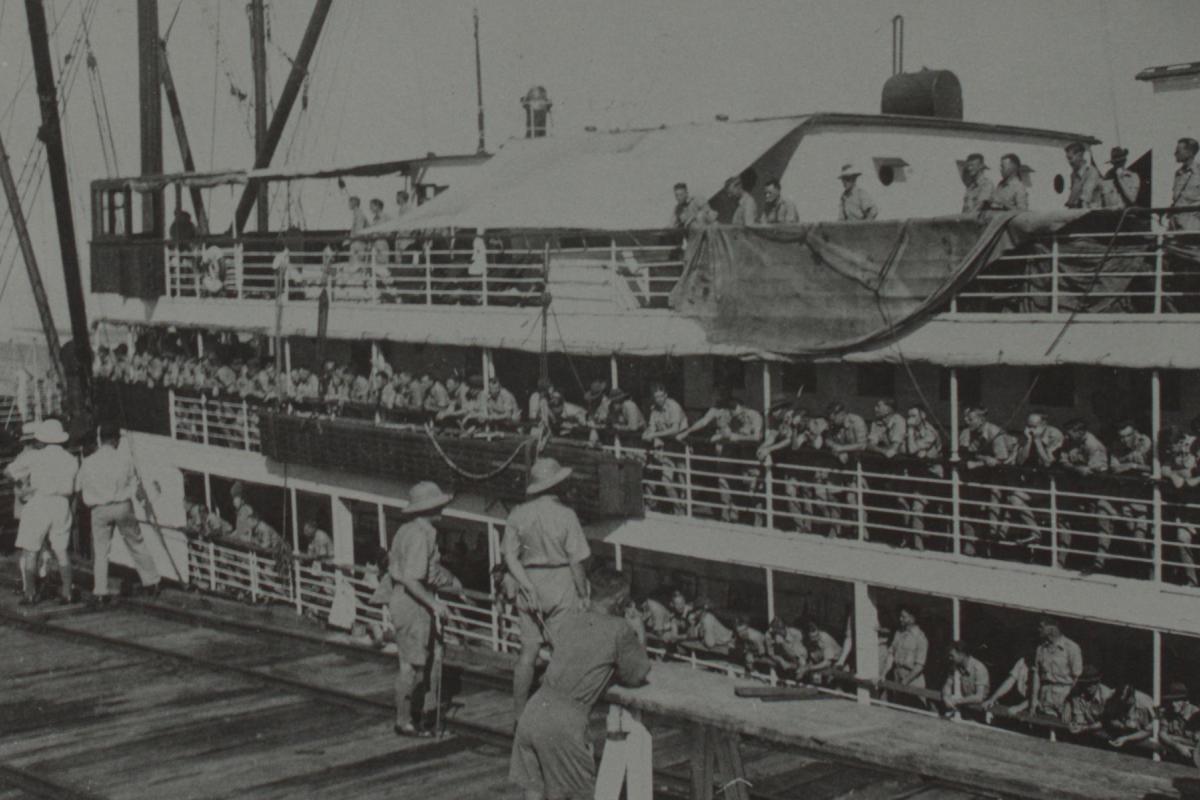
1. Recollections of the Arrival in Darwin
DAVID DRUCE
'We arrived at Darwin…September 11th…I went straight to Myilly Point. We were domiciled in houses. Of course, the civilians had all long since left and we would eat in a separate house which we called our mess, quite close to Mindil Beach….I can quite remember the first day there.'
NTRS 226 TS 516
REX CAUDLE
'Many of us referred to the period from 3 September 1939 right through to almost the first raids, as the phoney war, simply because there was no actual enemy activity.'
NTRS 226 TS 26, Page 21
BILL DEDMAN
'When we arrived I would say there were hundreds, or more people, and we got a great welcome from [them], and the garrison who turned out too, which welcomed us from the Larrakeyah area.'
'Then, after the ceremony, we marched then out to Vestey's Meatworks. It was a very hot day, and we were absolutely saturated in perspiration when we arrived at Vestey's Meatworks. The important part, as we marched into Vestey's Meatworks quite a number of signs had been put up there: 'All ye that enter here are abandoned'. And other sayings of: 'You have come to Darwin, we wish you the best of luck'. Then after we settled in and set up all our beds etcetera in the Vestey's [with] cement floors ... We then went on guard duty straight away.'
NTRS 226 TS 692, Page 2
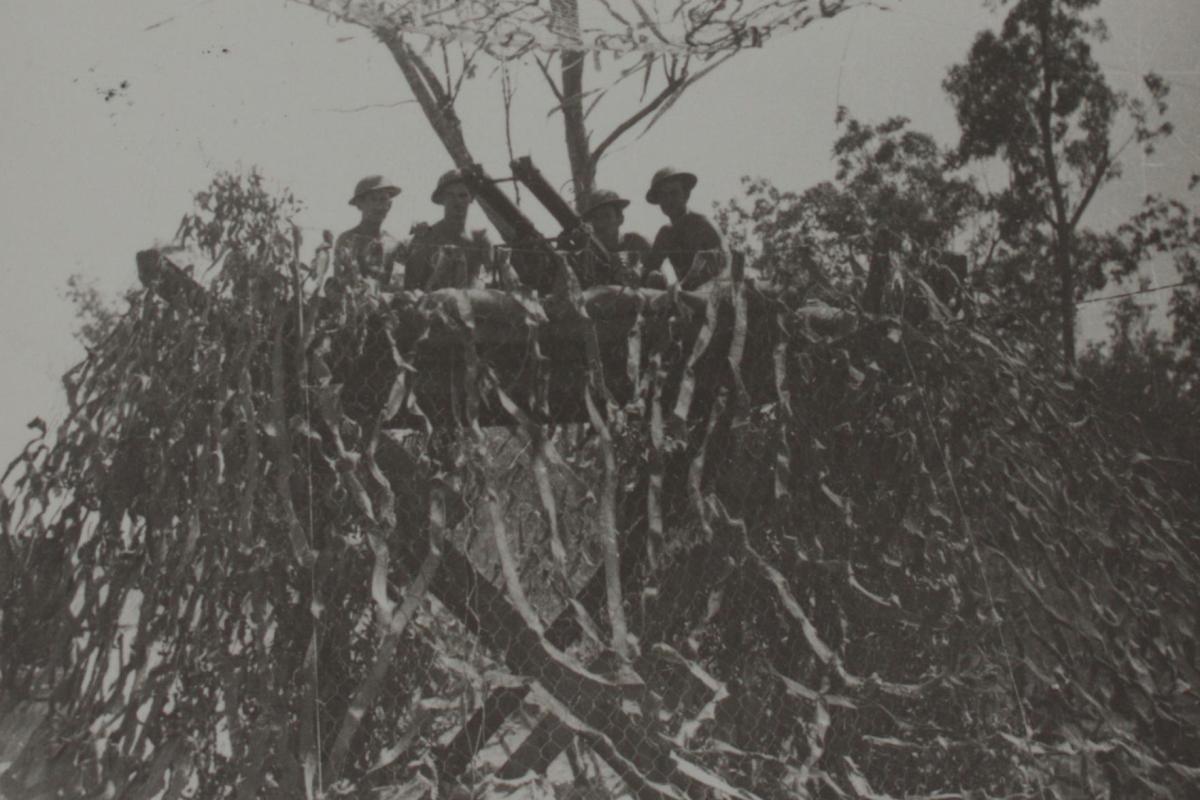
2. Recollections of a Soldier’s Duty
BILL DEDMAN
From the time of the first bombing raid until September 1942 Bill Dedman said that '…the soldiers that were stationed in Darwin were on practically 24 hour duties, day in week in. We became very, very tired people, until I was evacuated from Darwin.'
NTRS 226 TS 692, Page 15
BRUCE ACLAND
Prior to the bombing, following the fall of Singapore, Bruce describes that attitudes changed, '…then Singapore fell. Then news started to change. As the Japanese progressed further and further south, and it wasn’t taking very long, there’d become a general awareness around Darwin that we’d better look out for ourselves. And we did.'
NTRS 226 TS 677, Page 4
REX CAUDLE
Following the Japanese attack on a convoy of troop ships, including the US heavy Cruiser Houston, between Darwin and Timor, a few days before the 19th February 1942, Caudle recalls that 'everybody wondered what was going on, and the first time I realised that there had been action was when the wounded and dead from the Houston were brought ashore on the ships pinnaces draped with American flags. Fortunately we were able to turn on a pretty roughly assembled Guard of Honour whilst flag draped bodies were brought ashore. It was then we realised that the war was really getting dinkum.'
NTRS 226 TS 26, Page 15
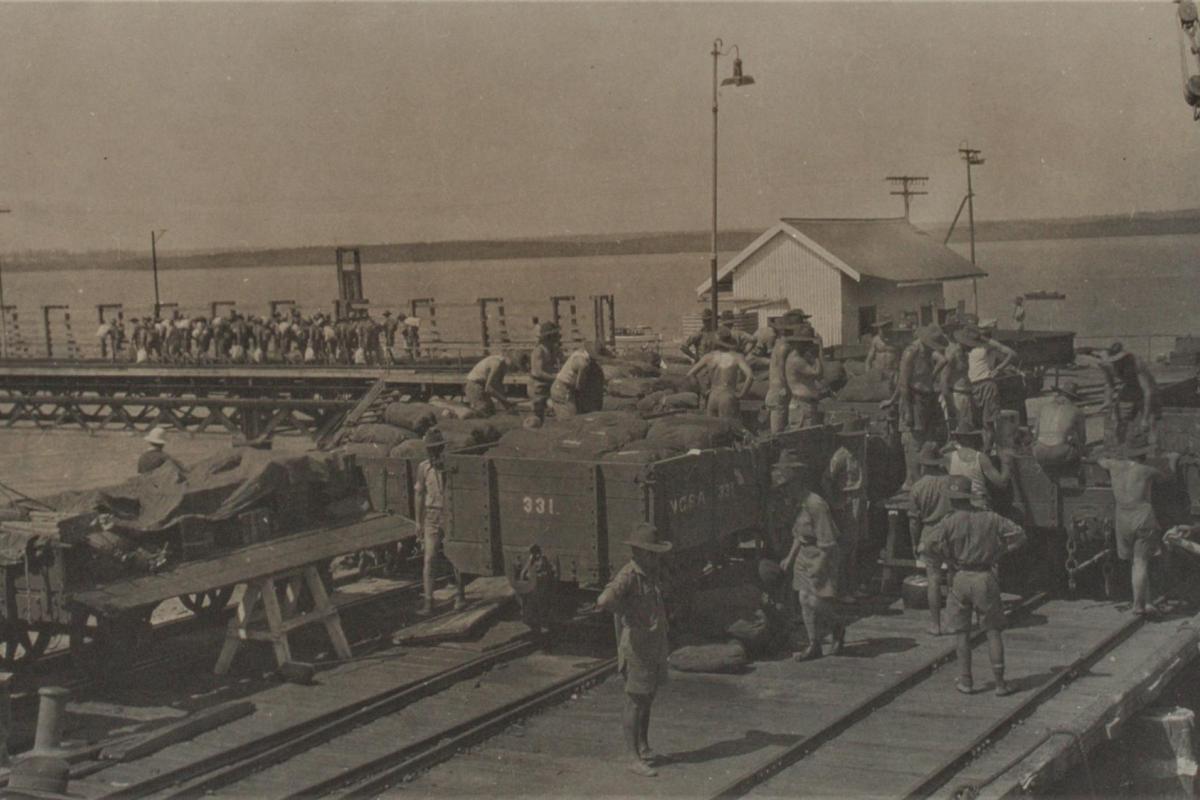
3. Recollections of Work
War creates work. During the war period infrastructure projects, agriculture, and the provision of supplies kept troops, Civil Construction Corps, Allied Works Council members, and civilians busy. From 1942 the war intensified with the start of the bombing raids.
BILL DEDMAN
'There was a ship called the Tulagi, and it was owned and controlled by Burns Philps, and it arrived in Darwin on this particular day, and the town was out of beer. And the wharf workmen decided to go on strike, so immediately instructions came from Lieutenant Colonel H.C. Robinson to Major A.P. McDonald to send troops down, and with armed [rifles], Lewis machine guns etcetera - to unload the wharf. So a lot of us went down and stripped off into shorts and boots, ...unloading the cargo off the Tulagi.'
NTRS 226 TS 629, Page 9
REX CAUDLE
'It is not generally known that we had the donkey pack trains in the Territory, but they served a very valuable purpose. The men were very attached to their donkeys and although the language was most profane at times they protected their animals and looked after them very well.'
NTRS 226 TS 26, Page 34
'I had to take over the complete Shell Installation and be trained in a very short period for the running and operation of this.'
NTRS 226 TS 26, Page 25
'The main function was to keep the supply of bomber and fighter fuel going right down as far as Mataranka and as a result the Shell Installation at McMinn Street was a hive of activity, in some cases 24 hours a day…Its not the easiest or cleanest of jobs cleaning 44 and 64 gallon drums but after a while my team became proficient.'
NTRS 226 TS 26, Page 25
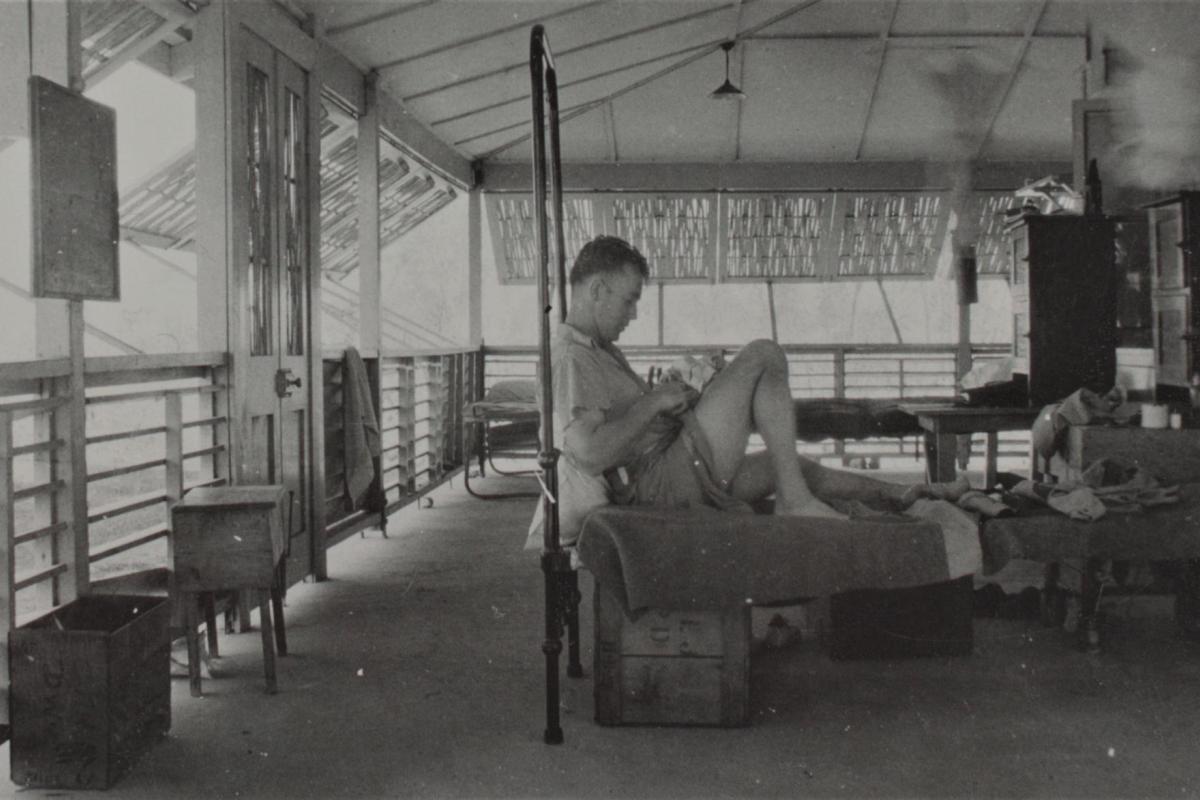
4. Recollections of Living Conditions
DAVID DRUCE
David mentions eating tinned fish, rice and hard biscuits for the first six months in Darwin... 'We had very little food and poor food and we had what we called “goldfish and rice”. That was tinned pilchards, shocking things, and rice for breakfast, dinner and tea, nothing else for quite a few weeks.'
NTRS 226 TS 516, Page 6
They had tinned sausages... 'Whether it’s correct or not, but there was a rumour that they were leftovers from the 1914 War.'
NTRS 226 TS 516, Page 18
'Then we started to get …tins of Kraft cheese, and I can remember a bag of onions came from somewhere…after about six months, the food definitely improved as the communications to Darwin and the organisations started to be effective and the Army was coming.'
NTRS 226 TS 516, Page 18
REX CAUDLE
'The living conditions at Vesteys although primitive in some ways were quite adequate…although the facilities were far from what we were used to in southern capitals. However, with the usual Australian serviceman’s ability to improvise we made ourselves quite comfortable.'
NTRS 226 TS 26, Page 2
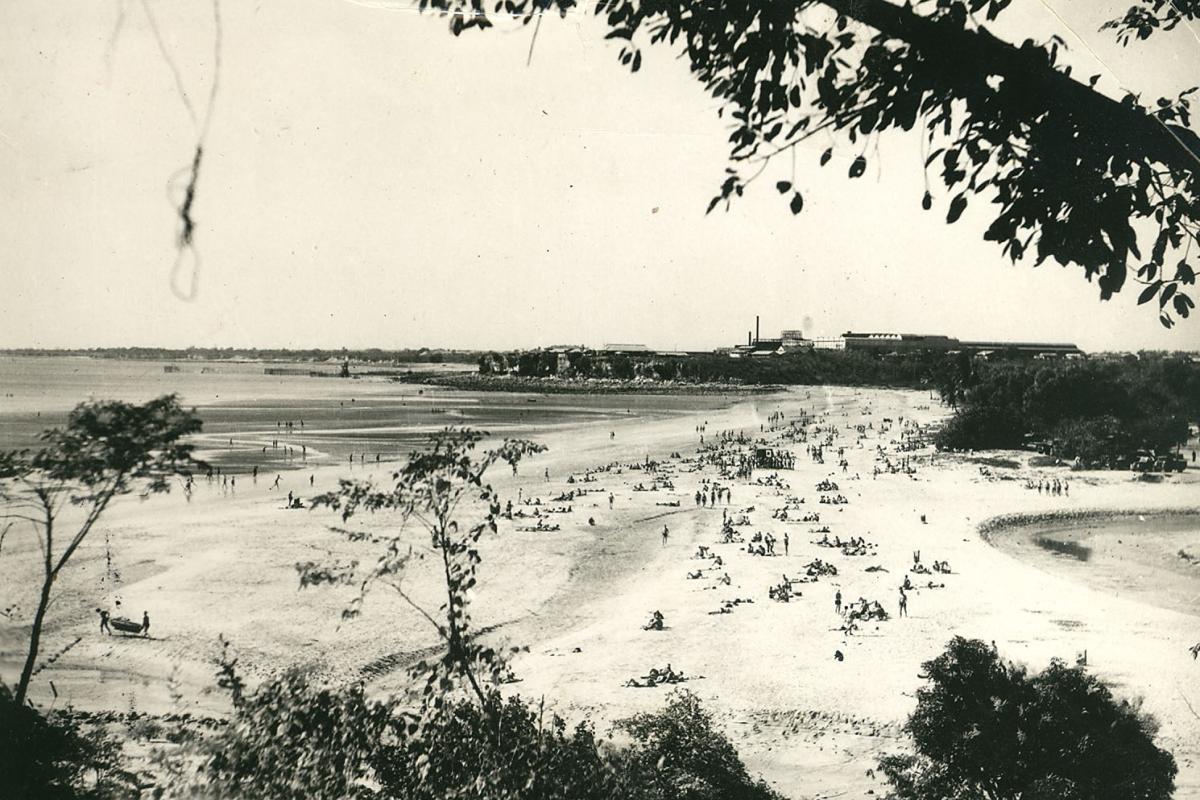
5. Recollections of Leisure Time
BILL DEDMAN
'We used to get out, and in the afternoon we'd go to Dripstone and we'd dig a hole; we'd take a case of beer out, and we'd bury that in the sand. Then at night time we'd go back, and we'd sit around and light a camp fire. Peter Humble and [Bob] Rowan used to play their particular instruments, and the girls used to have dancing around in the sand. It was very nice, and there was no [misbehaving]. There was a lot of respect for our women in Darwin, and nothing was going wrong in the moral side of it. Everyone enjoyed the activities that went on, with the music and a few beers that we used to have during the evening. We'd all pack up around about midnight and go back to our respective [camps and] homes.'
NTRS 226 TS 26, Page 3
'We had a fish trap down at the bottom of Bullocky Point. We used to go down there and take the fishing out. Which we had to be very careful, had to wear our heavy boots, because once the tide went out we found that stingrays used to get in there, and little crocs... But we got quite a good supply of fish to keep us going for our menu, which used to be taken up and put in the freezers at Vestey's Meatworks.'
NTRS 226 TS 26, Page 5
BRUCE ACLAND
'The Town was fascinating. There were all sorts of nationalities there. There were some pretty rough types. The Gordon’s Don Hotel was referred to as “The Bloodhouse”, and really that was a good description of it. You’d often see somebody hurled out of the swinging doors of the Don onto the footpath outside.'
NTRS 226 TS 677, Page 4
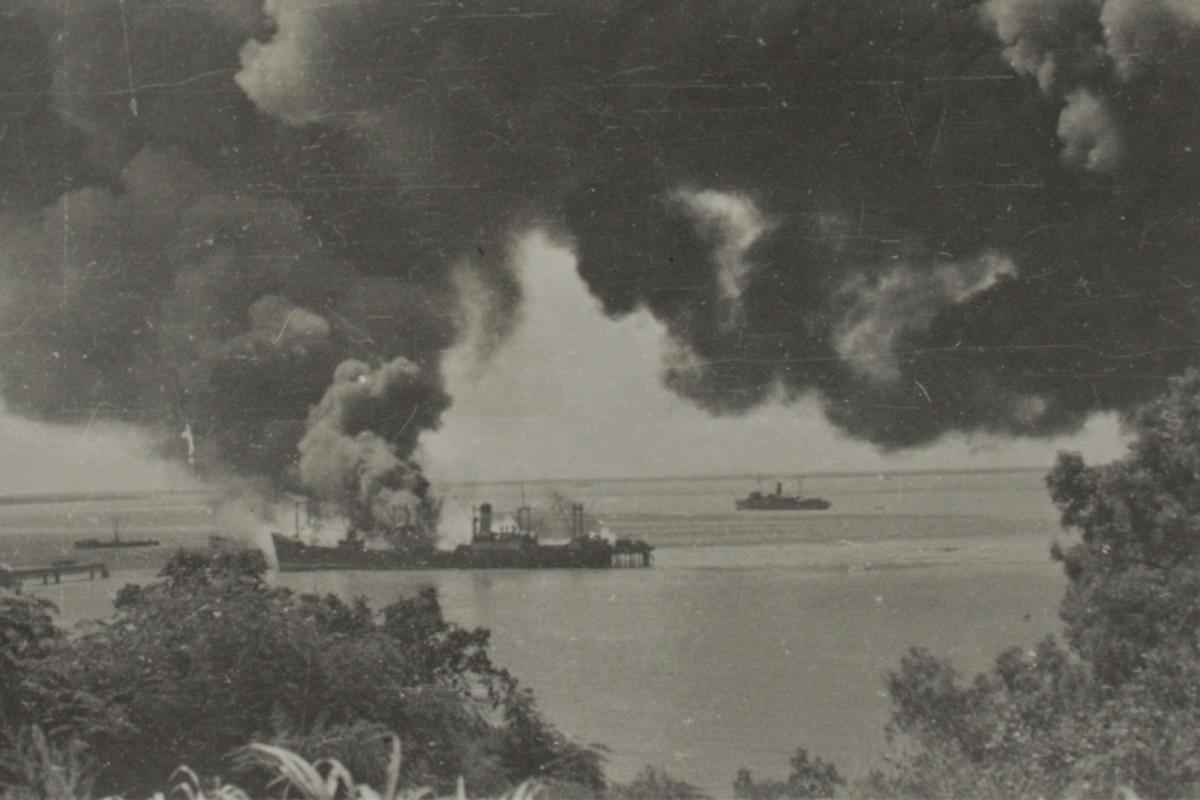
6. Recollections of the 19 February 1942, Bombing of Darwin
REX CAUDLE
'I was stationed at Vestey's and my first indication that anything was amiss was uneven noise of incoming aircraft.'
NTRS 226 TS 26, Page 16
'Almost immediately Berrimah 3.7 ack ack battery opened up and you could see the bursts well underneath the leading squadrons… I realised that they were not practice shells but high explosive... As far as I can remember the first bomb that was released by the leading squadron was the one that hit the hospital. I watched the fall of that bomb amongst others and most of us were mesmerised.'
NTRS 226 TS 26, Page 17
Following the second bombing raid on the 19th, Caudle found himself in the city area of Darwin where he proceeded to take photographs of the damage... 'When I was doing the photography and approached the shattered Bald residence in the distance I saw what I thought to be a baby. Naturally I was horrified but on rushing forward found it to be one of the dolls belonging to one of the children.'
NTRS 226 TS 26, Page 30
MELVIN DUKE
Melvin Duke was onboard the USS Peary, when it was hit by enemy fire. Duke was thrown into the water… 'so we went to the hospital and we were waiting in the casualty section when another raid come on and they thought they were going to bomb the hospital…they told us to clear out – everybody that could. So we, not knowing the territory and there was no naval command or anything there at the time, so we said “I think we’ll just walk on down to Brisbane and report in” [Laughter] – this is how much we knew about the territory…'
NTRS 226 TS 41, Page 2
BILL DEDMAN
'Throughout the day we were just carrying, and putting bodies up on the shore... Of course, then, at eleven o'clock the second raid started. But the wharf wasn't touched at that particular time. It was mainly concentrated on the RAAF [base], which they pattern-bombed, and completely destroyed the RAAF [aerodrome].'
NTRS 226 TS 692, Page 15
BETTY DUKE
'We stayed there, down on the waterfront, watching the ships in the harbour that were being bombed. We watched the Zealandia go down; and the little Tulagi, we saw that beach; and we saw the hospital ship struck; and the little Peary, we watched that go down. It was a brave little ship with its one gun firing right until it sunk. Not a very pleasant sight, and it was something that's always stayed in my mind all these years.'
NTRS 226 TS 791
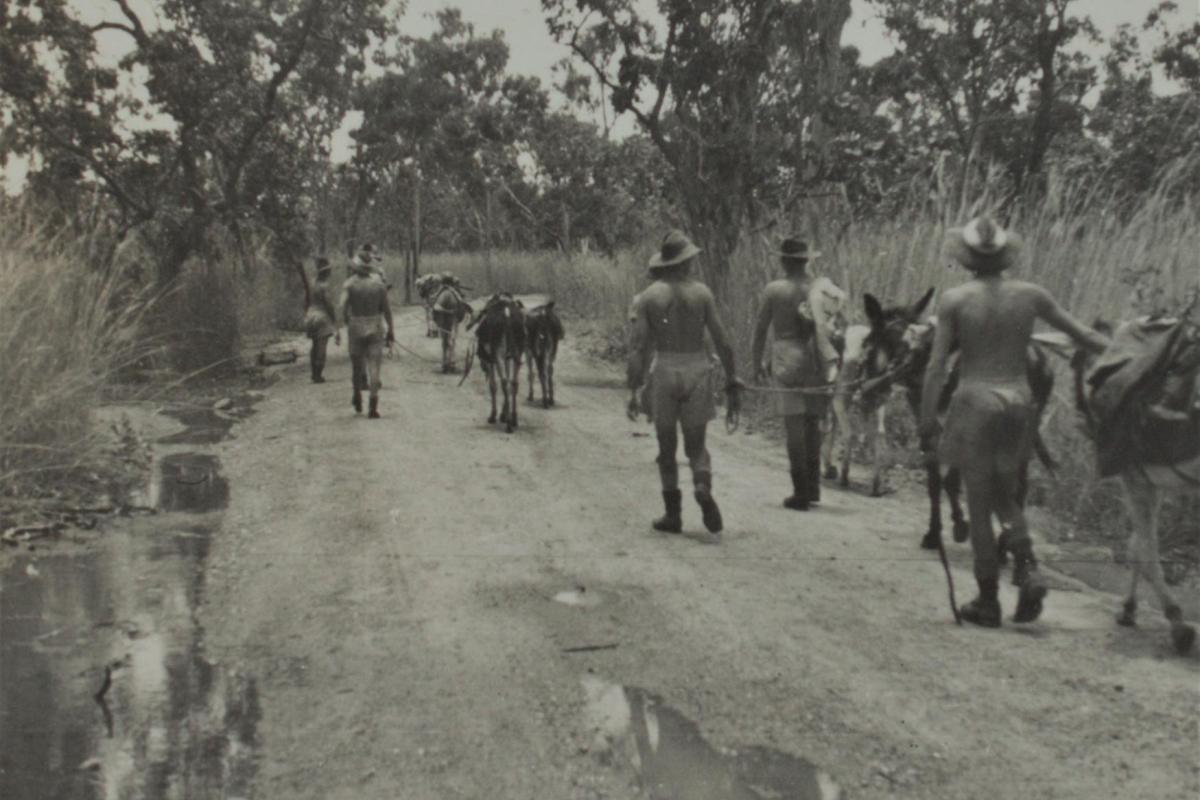
7. More Information
The quotes used throughout this presentation were sourced from the following oral history interviews. You can search for these interviews in our catalogue.
REX CAUDLE
NTRS 226 TS 26
Rex Caudle arrived in Darwin in March 1939, as a member of the regular Army and quartered at Vestey’s Meatworks.
DAVID DRUCE
NTRS 226 TS 516
David Druce enlisted in the Royal Australian Naval Reserve and joined the Writer and Supply Branch in May 1941. He was drafted to Darwin, arriving there in September 1942.
MELVIN DUKE
NTRS 226 TS 41
Melvin Duke was an American serviceman onboard the USS Peary, when it was hit by enemy fire on the 19th February 1942
BRUCE ACLAND
NTRS 226 TS 677
Bruce Acland came to Darwin during the Dry Season 1940 working for the Department of Civil Aviation as a civilian aeradio operator, and remained in the town until October 1942.
BETTY DUKE
NTRS 226 TS 791
Betty Duke nee Page, arrived in Darwin in 1939. In 1941 she began nursing in the Military Ward of the General Hospital in Darwin. When war broke out she was appointed Divisional Commander of the Red Cross and assisted in preparing the isolation wings for a Military Hospital.
Images used throughout this presentation have been sourced from the following collections.
REX GARNET CAUDLE NTRS 284
WILLIAM COLEMAN NTRS 884
LAWRENCE COFFEY NTRS 1705
CHARLES “MOTH” EATON NTRS 2517
HARRY WENTWORTH EYRE NTRS 2613
GEORGE HODGINS NTRS 1361
VICTOR LEVITT NTRS 3433
WILLIAM McKINNON NTRS 1336
JAMES MITCHELL, NTRS 886
NORMAN TAYLOR NTRS 1351
WILLIAM TURNER NTRS 709
KEITH WINTERBOTHAM NTRS 363

![NTAS, C Gilbert, NTRS 1643, Item 3, DMF [Darwin Mobile Force] Arriving in Darwin March 1939 on board ship Photograph of soldiers on board a ship, arriving at port in Darwin.](/system/files/styles/600_wide/private/uploads/stories/galleries/2025-04/NTRS%201643%20Item%203_CROP_0.jpg?itok=L23-E7GB)
![NTAS, C Gilbert, NTRS 1643, Item 2, DMF [Darwin Mobile Force] Arriving in Darwin March 1939 on wharf Photograph of soldiers standing in a line on the wharf.](/system/files/styles/600_wide/private/uploads/stories/galleries/2025-04/NTRS%201643%20Item%202_DMF%20arriving%20in%20Darwin%20March%201939%20on%20wharf_CROP_0.jpg?itok=FBc3rDI5)
![NTAS, Rex Caudle, NTRS 284, Item 187 “One of the 2/25 Battalion companies marching past the saluting base” [Smith Street Darwin, circa 1941] Soldiers marching down a street with a crowd gathered watching.](/system/files/styles/600_wide/private/uploads/stories/galleries/2025-04/NTRS%20284%20Image%20187_0.jpg?itok=sGdebBvs)
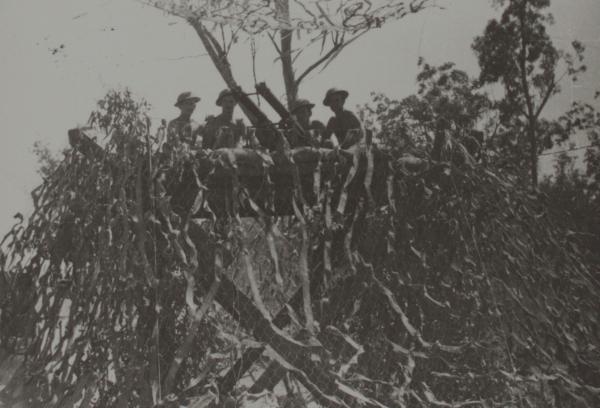
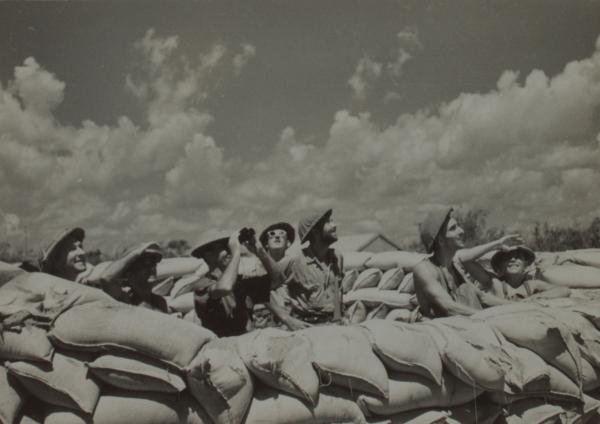
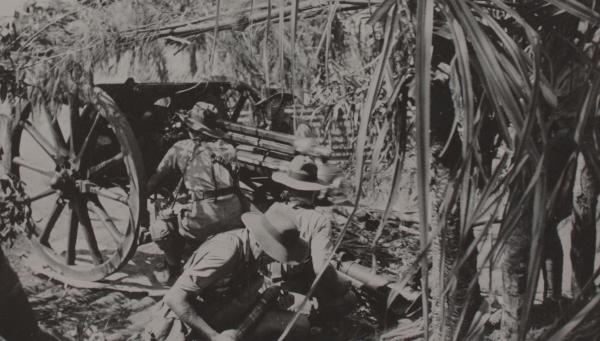
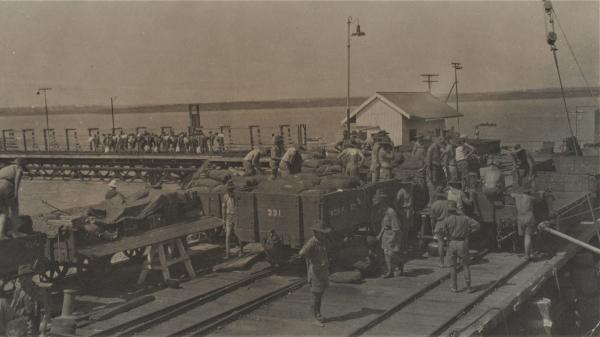
![NTAS, Rex Caudle, NTRS 284, Item 87, [Donkey pack trains operating out of Darwin] Photograph of donkeys and soldiers walking along a dirt road.](/system/files/styles/600_wide/private/uploads/stories/galleries/2025-04/NTRS%20284%20Image%2087_Edited.jpg?itok=omebHgHj)
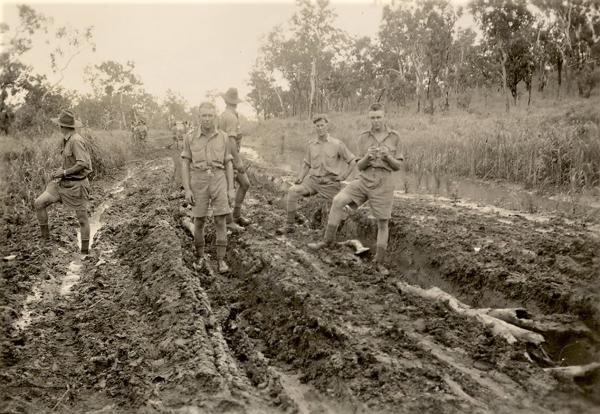
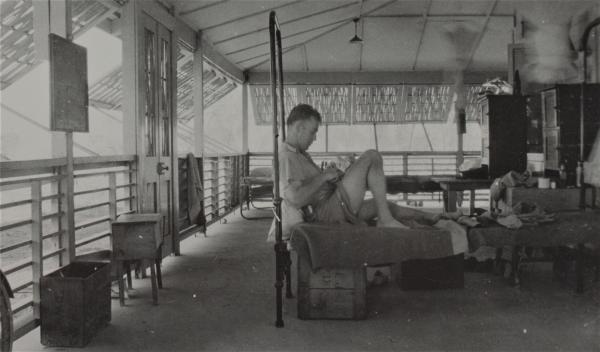
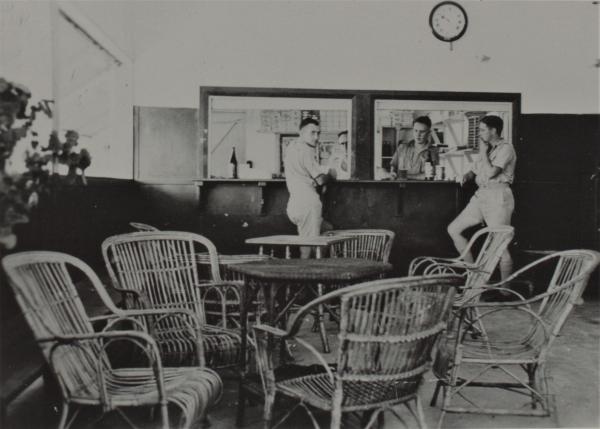
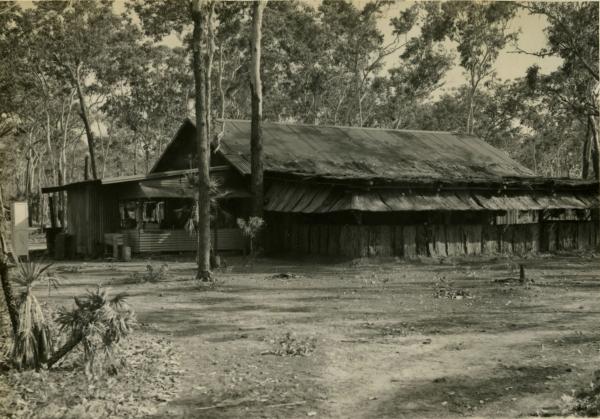
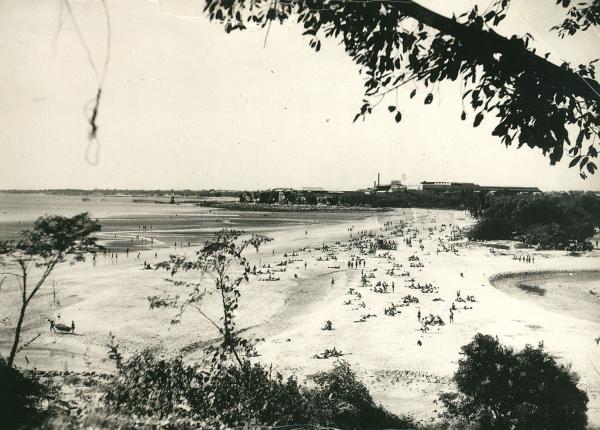
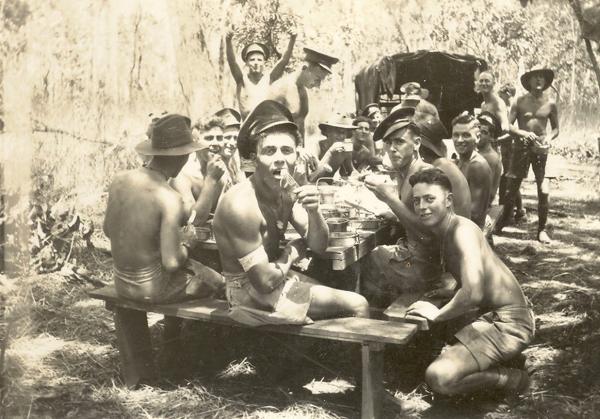
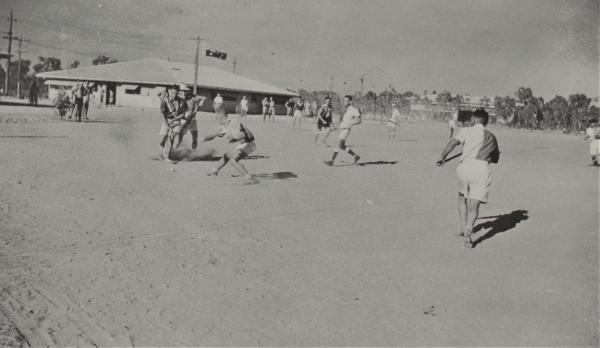
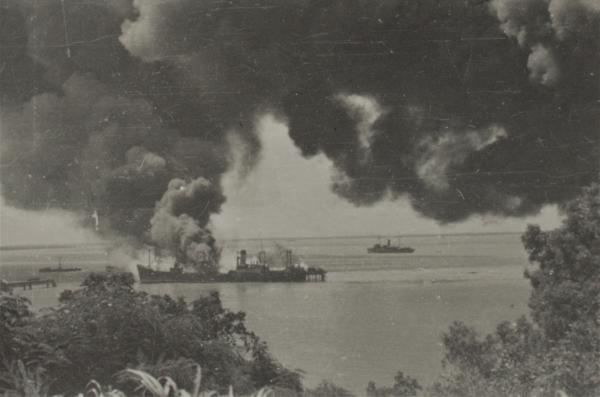
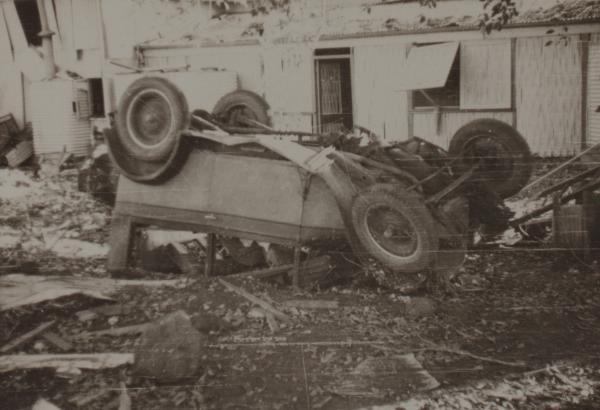
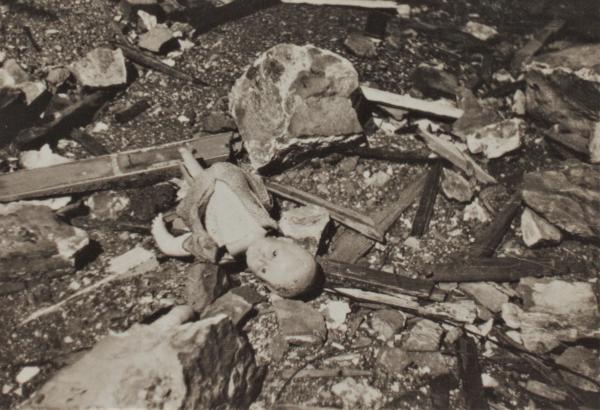
![NTAS, Rex Caudle, NTRS 284, Item 89, [Donkey pack trains operating out of Darwin] Photograph of soldiers and donkeys walking along a dirt road.](/system/files/styles/600_wide/private/uploads/stories/galleries/2025-04/NTRS%20284%20Image%2089_Edited.jpg?itok=NwBzNISn)

